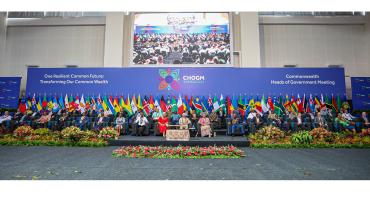The Commonwealth is hosting an online discussion on education for migrants and refugees for the first time on its Education Hub.

The Commonwealth is hosting an online discussion on education for migrants and refugees for the first time on its Education Hub.
‘Education for Migrants and Refugees’ is the latest ‘eDiscussion’ topic on the Hub and has invited submissions from more than 800 education policymakers and professionals from across the 52 Commonwealth countries. It seeks to find ways to educate millions of displaced people facing some of the most challenging conditions.
Commonwealth Secretariat education adviser Paul West, who is facilitating the discussion, said, “There’s such a huge need for refugees who have been displaced to receive education, and this discussion aims to find some of the solutions for providing it.
“Refugees are often at a distinct disadvantage when it comes to access education, and educators have a crucial role in enabling migrants and refugees to settle into new countries and environments.
“It’s clear that non-governmental organisations are stepping up and providing that support. But it would be great to hear what governments are also doing across the Commonwealth.
“We’re keen for as many people as possible to take part before the 30th June deadline because it’s crucial that we learn about the many innovative ways that refugees and migrants are being supported and helped to adapt to their new circumstances.”
The debate follows the release of figures from the Office of the United Nations High Commissioner for Refugees showing that an unprecedented 65.3 million people around the world have been forced from their home since 2015. Among them are more than 21 million refugees, over 50 per cent of which are under the age of 18.
There are also 10 million stateless people who have been denied a nationality and access to basic rights such as education, healthcare, employment and freedom of movement. Nearly 34,000 people are forcibly displaced every day as a result of conflict or persecution.
Mr West added, “Learning institutions and organisations play a key part in the provision of education to migrants and refugees. However, while there have been efforts to make education accessible to migrants and refugees worldwide, this role often falls to non-governmental organisations. In many cases, the only choice available is low-cost private sector education. It is extremely important that governments ensure the education and training migrants and refugees.”
Peter Riddell of Initiative of Change, a global movement of people that seeks to bring about a just, peaceful and sustainable world for everyone, is co-moderating the eDiscussion.
Participants are being asked to respond to the following question:
- What kind of educational approach and policies (including languages) are needed to embed the sustainable development goals and a human rights approach into the curriculum of adult educators working with migrants and refugees.
- How can migrant and refugee rights be better supported with teaching and learning materials and resources? How can the needs of migrants and refugees be better supported in terms of better understanding their human rights under international law?
- What mechanisms exist for the provision of education? Do governments provide the necessary education systems and is there a role for private sector? What are the best ways for educational practitioners to engage with migrants and refugees to develop a transformational relationship with their communities of adoption and origin?
To find out more or join the discussion click here.
Notes to editors
1) The Commonwealth Education Hub is a pilot initiative of the Commonwealth Secretariat. The Education Hub aims to provide an integrated and user-friendly ‘one-stop-shop’ supporting education policymakers and professionals across the Commonwealth to connect, consult and collaborate more effectively, and to share and access relevant knowledge.
2) The Education Hub offers four key services through an email-based Community of Practice and a website:
- Collect: The Education Hub website offers access to a curated collection of digital knowledge resources that include Commonwealth policy tools and frameworks, country policies and good practices, as well as the ‘discussion summaries’ produced by the Community of Practice.
- Connect: The Education Hub currently connects more than 800 education policymakers and professionals from across 52 Commonwealth countries through the Community of Practice mail group. It also provides links to Commonwealth organisations and wider partners and resources.
- Consult: Once connected through the Community of Practice, members can ask policy questions, request resources, engage in global advocacy and participate in policy debates.
- Collaborate: The Educations Hub supports collaboration by sharing information, creating networks, and connecting partners for research, resources and innovation. It offers tools for team collaboration via the Secretariat’s Commonwealth Connects platform.
3) Paul West is an Education Adviser in the Commonwealth Secretariat’s Health and Education Unit. More information about the Education Hub can be found here: https://www.thecommonwealth-educationhub.net/
4) Peter Riddell is a National Coordinator of Initiatives of Change and Convenor of its Agenda for Reconciliation Programme. In his latter capacity, he has overseen the development of a programme of training for refugees since 2005. More details about Initiatives of Change can be found here: http://uk.iofc.org/
5) Contributions received are being published on the eDiscussion page: https://www.thecommonwealth-educationhub.net/refugees/. Contributions may be emailed to the facilitators at: [email protected]
6) The discussion will close on Friday 30 June.
Contact
For more information please contact Ben Maloney in the communications team: [email protected] / +44 20 7747 6165.



